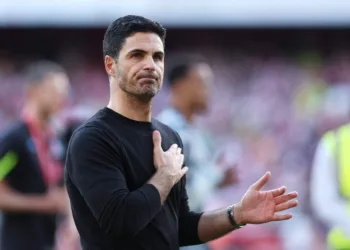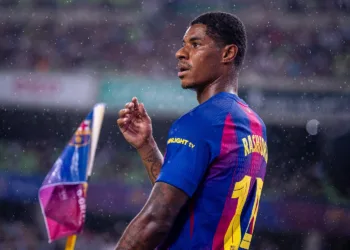It was exactly one year ago next Monday when Manchester United fans were getting themselves excited ahead of another new era, which was beginning at Portman Road against Ipswich Town that night. The optimism was palpable, the expectations sky-high, and the appointment of Ruben Amorim felt like a genuine turning point for a club that had endured years of mediocrity and false dawns.
Twelve months later, the picture is far more complicated. Man United under Ruben Amorim have shown glimpses of genuine progress, particularly in recent weeks, but the journey has been turbulent enough to leave serious questions about whether this era will ultimately succeed where so many others have failed.
Ruben Amorim is approaching the one-year anniversary of his first match as Manchester United manager. Here, we attempt to make sense of his 12 months at the helm.
Table of Contents
The Appointment That Promised So Much
Erik ten Hag had been dismissed at the end of October after a poor start to 2024-25, and in his place United appointed Ruben Amorim. Young, highly regarded, charismatic and eloquent, his arrival marked a notable change of direction for the club – and that’s even before you consider the switch to a back three.

The circumstances surrounding Ruben Amorim’s appointment made it feel different from previous managerial changes at Man United. Amorim was the first managerial appointment of the club’s relatively new leadership group and part-owner Sir Jim Ratcliffe, while the success he’d enjoyed at Sporting CP – whom he guided to two league titles, including their first for 19 years – filled much of the fanbase with optimism.
For all intents and purposes, Amorim was an exciting hire. However, his first year in charge has been anything but smooth, making more recent hints of progress difficult to draw conclusions from.
A Year of Lows and Memorable Disasters
The raw numbers paint a concerning picture of Man United’s first year under Ruben Amorim. While there have been some fairly memorable moments and results, Amorim’s first year has been littered with more occasions and records that United fans would probably rather forget: the Europa League final defeat to Tottenham, a worst-ever Premier League finish, their first cup elimination by a fourth-tier club in this season’s EFL Cup.
These weren’t just disappointing results – they represented genuine historical lows for Man United, the kind of embarrassments that would have been unthinkable during the club’s dominant years.
The System Debate: Stubbornness or Conviction?
Perhaps no aspect of Ruben Amorim’s tenure at Man United has generated more discussion and controversy than his tactical approach. Of course, so much focus since his appointment has been on the “system” and Amorim’s decision to switch United to a back three, which was practically unheard of at the club.
The results initially failed to justify the tactical revolution, leading to increasing pressure. And when he failed to oversee a dramatic improvement in United’s fortunes compared to Ten Hag, more and more that system and its suitability was called into question. And yet, that only seemed to make Amorim more adamant.
The formation wasn’t the issue, he insisted, and he felt he needed to stick to the principles he’d committed to because only then would the players buy into his ideas. But as points continued to elude them and their slide down the table went unchecked, the external noise grew.
Ruben Amorim’s unwavering commitment to his tactical philosophy in the face of mounting criticism became one of the defining narratives of his first year at Man United – for better or worse.
The Statistical Nightmare: Worse Than Ten Hag
The most damning indictment of Man United’s first year came in their rolling points-per-game average, which reached historic lows. There were two periods last season when United’s 12-game rolling points-per-game average in the Premier League dropped to just 0.83, the lowest it had been since Sir Alex Ferguson departed in 2013.

Shockingly, the situation actually deteriorated even further. Then, as United made a slow start to 2025-26, there was a four-match spell when that 12-game rolling points-per-game average (stretching back into 2024-25) went as low as 0.75. To give you a better idea of how bad that was, their figure was 1.42 – so, nearly double that – when Ten Hag was fired.
The Context Caveat
It should be noted that their most alarming 12-game period comprised a section of 2024-25 when United’s domestic season was beyond saving and their focus was on the Europa League, but there’s no denying how underwhelming they were. This is Manchester United, after all.
| Period | 12-Game Rolling PPG | Context |
|---|---|---|
| Ten Hag firing (Oct 2024) | 1.42 | Poor start to 2024-25 season |
| Two periods in 2024-25 | 0.83 | Lowest since Ferguson left in 2013 |
| Early 2025-26 (worst spell) | 0.75 | Nearly half of Ten Hag’s figure at firing |
| Before Everton (current) | 1.75 | Best since December 2023 |
| December 2023 peak | 1.83 | After Boxing Day win over Aston Villa |
| Last time above 1.33 | Amorim’s 5th game | Until last month, only reached twice |
Signs of Life: Recent Improvement Under Amorim
Despite the turbulent journey, Man United have shown genuine signs of improvement in recent months under Ruben Amorim. Generally speaking, United do seem to have improved somewhat this season. They’ve certainly not been perfect by any stretch of the imagination, but they look a better, more cohesive team, and results have recently been heading in the right direction.
The statistical improvement is tangible and measurable. For instance, ahead of Monday’s clash with Everton, their 12-game rolling points-per-game average stands at 1.75. The last time it was higher than that was December 2023 after a Boxing Day win over Aston Villa took them to 1.83.
But How Sustainable Is This Progress?
The skepticism surrounding Man United’s improvement is warranted given the volatile nature of their season. But when their rolling points-per-game average hit 1.33 last month, it was only the second time they’d reached that figure since Amorim’s fifth game in charge; the point being, this remains a very recent development, so how representative is it?
Obviously only time can tell us that, but there are other hints of promise. Their expected goals output, for instance, offers some encouragement.
The Expected Goals Story: Attack Improves, Defense Struggles
Man United’s underlying numbers reveal a complex picture under Ruben Amorim, with clear improvements in some areas and concerning trends in others. The graphic below shows their non-penalty xG and non-pen xG against (xGA) on a six-game rolling average and it’s clear to see they’ve made progress since an incredibly difficult spell in the second half of 2024-25.
The Recent xG Deficit
The chart does also show United have actually been in an xG deficit (xGA is higher than xG) most recently, but we shouldn’t disregard the significance of four of their last six games being away from home. They also lost only one of those matches (W1 D2).

This context is crucial – Man United’s recent form includes managing difficult away fixtures while maintaining decent results despite being outperformed in expected goals terms.
Attacking Progress: The Impact of Summer Signings
Man United’s offensive improvement under Ruben Amorim coincides directly with key personnel additions in the transfer market. Despite that recent slip into an xG deficit, their figures for the season tend to reflect a greater sense of effectiveness in attack following the arrivals of Bryan Mbeumo, Matheus Cunha and Benjamin Sesko.
| Attacking Metric | Amorim’s 27 Games (2024-25) | First 11 Games (2025-26) | Change |
|---|---|---|---|
| Non-Pen xG per Game | 1.24 | 1.48 | +0.24 (+20% improvement) |
| Total Non-Pen xG (season) | – | 16.32 | 6th highest in Premier League |
For example, during Amorim’s 27 league games in charge last season, United averaged just 1.24 non-pen xG per game. After 11 Premier League matches this term, they’ve averaged 1.48 non-pen xG per game.
It’s not a monumental increase, granted, but it is an improvement of 20% and their 16.32 non-pen xG this term is the sixth highest in the Premier League. Considering Cunha is yet to find form in front of goal and Sesko – who’s now out injured for around a month – doesn’t look like he’s quite settled yet, it’s a decent start. And it’s reasonable to suggest there’s more to come.
The assessment suggests Man United’s attacking potential under Ruben Amorim hasn’t been fully realized yet, with two of their three major signings still adjusting or struggling. Once Matheus Cunha finds his scoring touch and Benjamin Sesko returns from injury and settles, the attacking numbers could improve further.
Defensive Concerns: The Worrying Trend
While Man United’s attack has improved under Ruben Amorim, their defensive metrics tell a significantly more concerning story. The flipside is that United are actually conceding better chances at the other end than they were before. Their 16.7 non-pen xGA this season is the second highest in the Premier League after Burnley (21.7), and on a per-game basis (1.51), that is considerably poorer than in Amorim’s 27 games last season (1.34).
| Defensive Metric | Amorim’s 27 Games (2024-25) | 2025-26 (11 games) | League Position |
|---|---|---|---|
| Non-Pen xGA (Total) | – | 16.7 | 2nd worst (only Burnley 21.7 worse) |
| Non-Pen xGA per Game | 1.34 | 1.51 | Considerably worse |
The deterioration in defensive expected goals is concerning for Man United, suggesting they’re allowing opponents higher-quality scoring opportunities than they did even during the difficult periods of last season.
The Fixture Difficulty Factor: Essential Context for the Numbers
Understanding Man United’s underlying numbers requires acknowledging their exceptionally brutal early-season schedule under Ruben Amorim. However, when looking at both xG metrics, we cannot ignore that United have only played 11 games this season. One of the main reasons that’s so pertinent is they had the fifth-hardest set of fixtures over the first 11 matchdays of 2025-26, according to the Opta Power Rankings.
The Opta Power Rankings Context
The Opta Power Rankings is a global ranking system that assigns an ability score to over 10,000 domestic football teams on a scale of 0-100, where zero is the worst-ranked team in the world and 100 is the best. The average rating of United’s opponents to date is 92.2, which reflects the fact they’ve faced Arsenal, Manchester City, Chelsea, Liverpool and Tottenham already.

Man United have already played five of the traditional “Big Six” clubs in just eleven matches – an exceptionally challenging fixture sequence that provides important context for their statistical performance.
So, when you take that into account, their 20% non-pen xG increase on a per-game basis looks even better and their non-pen xG figures appear a little less alarming – nevertheless, there’s clearly room for improvement with the latter.
Mental Resilience: The Late-Goal Phenomenon
One of the most encouraging developments at Man United under Ruben Amorim has been their newfound ability to fight until the final whistle and rescue results. But even if there are aspects like that where United are still showing some signs of weakness, there’s an argument that many of the positives from their start to 2025-26 are underpinned by an improved mentality.
Scoring When It Matters Most
They may still be giving up decent opportunities, but United’s penchant for late goals could be seen as evidence of them being made of sterner stuff than before.
The pattern goes beyond simple late goals and represents result-changing interventions. It isn’t just that they’re scoring them. After all, they had a run at the end of last season when five of eight goals were netted in the 80th minute or later. It’s more that they’ve a habit of changing the result in the latter stages.
The historical significance of this trend cannot be overstated. They’ve turned a draw into a win, or a defeat into a draw in three of their past four Premier League games; not only is that as many result-altering goals scored in the 80th minute or later as they’d managed in their previous 24 matches, but it’s only the third time in Premier League history that they’ve had such a run (also doing so in March/April 2001, and December 2016/January 2017).
| Result-Altering Late Goals Run | Period | Context |
|---|---|---|
| Current run | Last 4 games | 3 result-altering goals (80th min+) |
| Previous total | Previous 24 matches | 3 result-altering goals total |
| Historical precedent | March/April 2001 | Similar run achieved |
| Historical precedent | December 2016/January 2017 | Similar run achieved |
The Brighton Example: Psychological Impact
The 4-2 victory over Brighton perfectly illustrated Man United’s newfound resilience and mental toughness. It’s also worth noting that the one match out of their last four in which they didn’t score a result-altering goal after the 80th minute was the 4-2 win over Brighton, when Mbeumo netted deep into second-half stoppage time to kill the game off when the Seagulls had been pressing hard for an equaliser. So, it didn’t technically change the result, but it felt like it did at the time.

Obviously, it’s difficult to definitively prove collective mental strength, but this feels like a decent indicator at the very least.
Game State Analysis: Leading More, Losing Less
Man United’s game state statistics reveal significant and measurable improvement in their ability to establish and maintain leads under Ruben Amorim. And then, linked to this, figures pertaining to game state reflect well on United, too – especially in comparison to last season.
Time Spent Winning: A Dramatic Turnaround
| Season/Period | Time Leading | % of Game Time | Context |
|---|---|---|---|
| Entire 2024-25 season | 549 mins, 37 secs | 14.5% | Full season total |
| Amorim’s 27 games (2024-25) | 355 mins, 40 secs | – | Just part of season |
| 2025-26 (11 games) | 496 mins, 5 secs | 44.7% | Already 140 mins 25 secs more |
| Distance from full 2024-25 total | Only 53 mins, 32 secs away | – | Nearly matched in 11 games |
They’ve been in front for 496 mins, 5 secs (44.7%) in 2025-26, which is already 140 mins and 25 secs longer than they led across their 27 matches under Amorim last season (355 mins, 40 secs). In fact, they’re only 53 minutes and 32 seconds off overtaking their total for the entirety of 2024-25 (549 mins, 37 secs – 14.5%).

This represents an extraordinary turnaround in Man United’s ability to get ahead and stay ahead in matches – spending 44.7% of game time leading in just 11 games compared to 14.5% across the entire previous season.

Reasons for Optimism, But With Major Caveats
The evidence suggests Man United are moving in the right direction under Ruben Amorim, but significant uncertainties and questions remain unanswered. There is reason for optimism, then. Several reasons, actually. But as alluded to before, so much of it is still new to this United side that it remains unclear how much we should read into it.
Either way, whether the progress is momentary or lasting, United are still a long, long way off where they want to be, as that rather damning points-per-game-average chart succinctly highlights.
The improvement is real but the journey remains incomplete, and Man United’s historical standing demands far more than mere incremental progress.
The Verdict: Promise Without Proof
Ultimately, there has been just enough promise shown this season to suggest Amorim’s first year hasn’t been a completely failed experiment, but not enough to dispel the doubts that have festered over the past 12 months. United do look fitter, more cohesive and seemingly mentally tougher, yet the concerns that defined the early months of his tenure still linger.
The Window Is Closing: Contract Situation Adds Urgency
Time is becoming a critical factor for Ruben Amorim at Man United, with his contract situation adding urgency to the need for sustained success. The next stretch of the season, aided by a more forgiving run of fixtures and riding the kind of momentum Amorim hasn’t had before at United, should provide more clarity about this team’s true level. What’s already clear, however, is the window of ambiguity is closing: after a year of turbulence and gradual improvement, Amorim – who has a little over 18 months left on his contract – is now approaching the point where signs of promise must soon become something unmistakable.
The upcoming fixtures represent Ruben Amorim’s best opportunity yet to prove his methods work at Man United. With easier opponents on the schedule and momentum finally building after a full year of inconsistency, anything less than sustained success would raise serious questions about whether this project can ever truly succeed.

One year into the Ruben Amorim era, Man United have improved from their lowest points but remain far from their aspirations. The signs of progress are real – better attacking output, improved mental resilience, more time spent leading – but so are the doubts, particularly defensively. The next few months will determine which narrative ultimately defines his tenure at Old Trafford.
Read More: How Haiti Reached the 2026 World Cup Without Ever Playing at Home
FAQs
How has Man United performed in Ruben Amorim’s first year compared to Erik ten Hag?
Man United’s 12-game rolling points-per-game average dropped to 0.75 under Amorim, nearly half of the 1.42 figure when Ten Hag was fired. However, recent improvement has seen this rise to 1.75 before the Everton game, the highest since December 2023.
What have been the biggest lowlights of Ruben Amorim’s first year at Man United?
Major disappointments include a Europa League final defeat to Tottenham, Man United’s worst-ever Premier League finish, and their first cup elimination by a fourth-tier club in this season’s EFL Cup. The lowest point saw their rolling points-per-game average drop to 0.75.
How has Man United’s attacking improved under Ruben Amorim this season?
Non-penalty expected goals per game improved from 1.24 last season to 1.48 this season – a 20% increase. Their 16.32 non-penalty xG ranks sixth-highest in the Premier League after 11 games, following the arrivals of Bryan Mbeumo, Matheus Cunha, and Benjamin Sesko.
What defensive problems persist at Man United under Ruben Amorim?
Man United’s non-penalty xG against is 16.7 this season – second-worst in the Premier League after Burnley (21.7). At 1.51 per game, this is considerably worse than last season’s 1.34, though they’ve faced the fifth-hardest fixtures including Arsenal, Man City, Chelsea, Liverpool, and Tottenham.
What evidence suggests improved mental resilience at Man United this season?
Man United have scored result-altering goals in the 80th minute or later in three of their last four Premier League games – matching their total from the previous 24 matches. They’ve also spent 496 minutes leading (44.7% of game time) in just 11 games, already 140 minutes more than Amorim’s entire 27-game stint last season.








